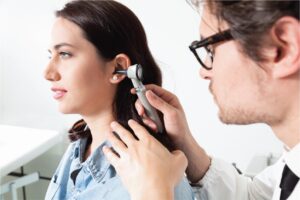What to Expect: How a Hearing Test Works

What did you say?
It starts out small. You have to ask people to repeat themselves once in a while. Pretty soon, you’re turning up the volume on your T.V. louder and louder and you find yourself missing out on conversations with loved ones.
Maybe it’s not you that’s experiencing hearing loss, maybe it’s a loved one that you’re seeing a difference in. Not everyone always notices the change in their hearing because it can happen slowly and very gradually. It can be extremely frustrating when you are not able to communicate with someone important to you. You know that they must be feeling excluded from conversations and truly want better for them.
If one of these situations sounds familiar, it is most likely time for a hearing test to be done.
Do I Really Need a Hearing Test?
Hearing tests are not just for those who have noticed hearing loss or changes. Even newborn babies receive a hearing test the day they’re born. These hearing tests continue throughout our younger years too. Remember those hearing tests during Elementary school where you were placed in a booth and asked to raise your hand when you heard a sound?
Although we hope to never experience hearing loss, as we age, it becomes more likely. Those 65 and older have more than a 30% chance of having a hearing impairment. This is why it is recommended that adults have their hearing tested every 10 years until age 50 and then every 3 years after that.
Loss of hearing can occur for many reasons and other health conditions may also be related to your hearing loss including:
- Being exposed to loud sounds too often at work
- Using loud power tools or landscaping equipment
- Shooting guns
- Listening to loud music
- Impacted earwax
- Past or current ear infections
- Head injury
- Certain medications
- Inherited hearing Issues
- Allergies or a cold
Exposure to loud sounds happen over the years and are very common. If you have simply been exposed to sounds that are too loud or for too long, you will without a doubt be dealing with hearing loss at some point.
What If I Don’t Get My Hearing Checked?
Those that don’t have their hearing issues checked and treated have been found to be less likely to be involved in social gatherings that they normally would be, because they simply can’t hear what’s going on around them and they are embarrassed. This separation and isolation can lead to depression.
It has also been shown that untreated hearing loss can speed up the process of cognitive decline, and in turn, result in dementia. There is a part of your brain that is no longer being used once hearing loss gets to a certain point. But, if hearing loss is treated, you can keep that part of your brain active and slow the decline in mental health.
What Happens During a Hearing Test?
Hearing tests are incredibly easy. There is no pain associated with testing and it even takes place in a comfortable office environment.
When you come to the clinic for your first appointment, your hearing health history will be gathered. Because of the many reasons why your hearing could be changing, this history will help your doctor know what the cause could be, including if it could be inherited from your family. Work, hobbies and other important things you do each day will discussed.
After talking in detail about your hearing health, the actual hearing test will begin. During the test you will be asked to sit in a sound room or booth that is designed for complete silence. You will wear headphones or earplugs connected to an instrument called an audiometer. Most likely, a series of tests will be given, and each ear will be tested on its own.
At this point, the person conducting the test will give you instructions through your headphones. You will begin to hear different sounds that occur at different pitches and volume. The tones may be very quiet, some, you will barely be able to hear. You will be tested on the very softest sounds you can hear at each frequency.
There will be other kinds of tests done as well, for example, a speech test is when you are tested on words and sentences being said in different environments. They can start in a fairly quiet setting and then in an increasingly noisy environment. This can be used to test how you would hear in a “real-life” situation like a noisy restaurant.
A good, comprehensive hearing test will be able to tell the doctor important information about the kind of hearing loss that you have. This way, your doctor will be able to know what kind of treatment will work best for you.
After your test, your doctor will go over your audiogram, a chart, or graph used to record your results.
Understanding Your Audiogram Test Results
Your doctor will discuss important information that was gathered during your hearing test. The audiogram results show the softest sounds you can hear at different frequencies. The vertical axis shows the volume of the sounds. The horizontal axis shows the pitch.
Your test results will be mapped out in decibels of hearing threshold level (dB HL). They are based on the perception of sound pressure levels at all different frequencies. Every tone you heard during the test will show a mark on your audiogram. Each ear will be mapped and plotted separately and so you will see two different lines connecting each mark.
What Happens After My Hearing Test?
When your testing is complete and your doctor has talked with you about your results, treatment options will be discussed. For many people, that can mean hearing aids, but other types of treatment will be examined as well.
Schedule a Hearing Test Today!
Hearing is how we communicate. It’s vital to our well-being and a healthy lifestyle. Make sure to not only get your baseline testing done but also the recommended follow-up testing. This way, you can find possible problems sooner than later and continue enjoying all that you love, including those that you love.
Find out more about all that we offer! Contact Fairfax Hearing Center to schedule a consultation and hearing test.

